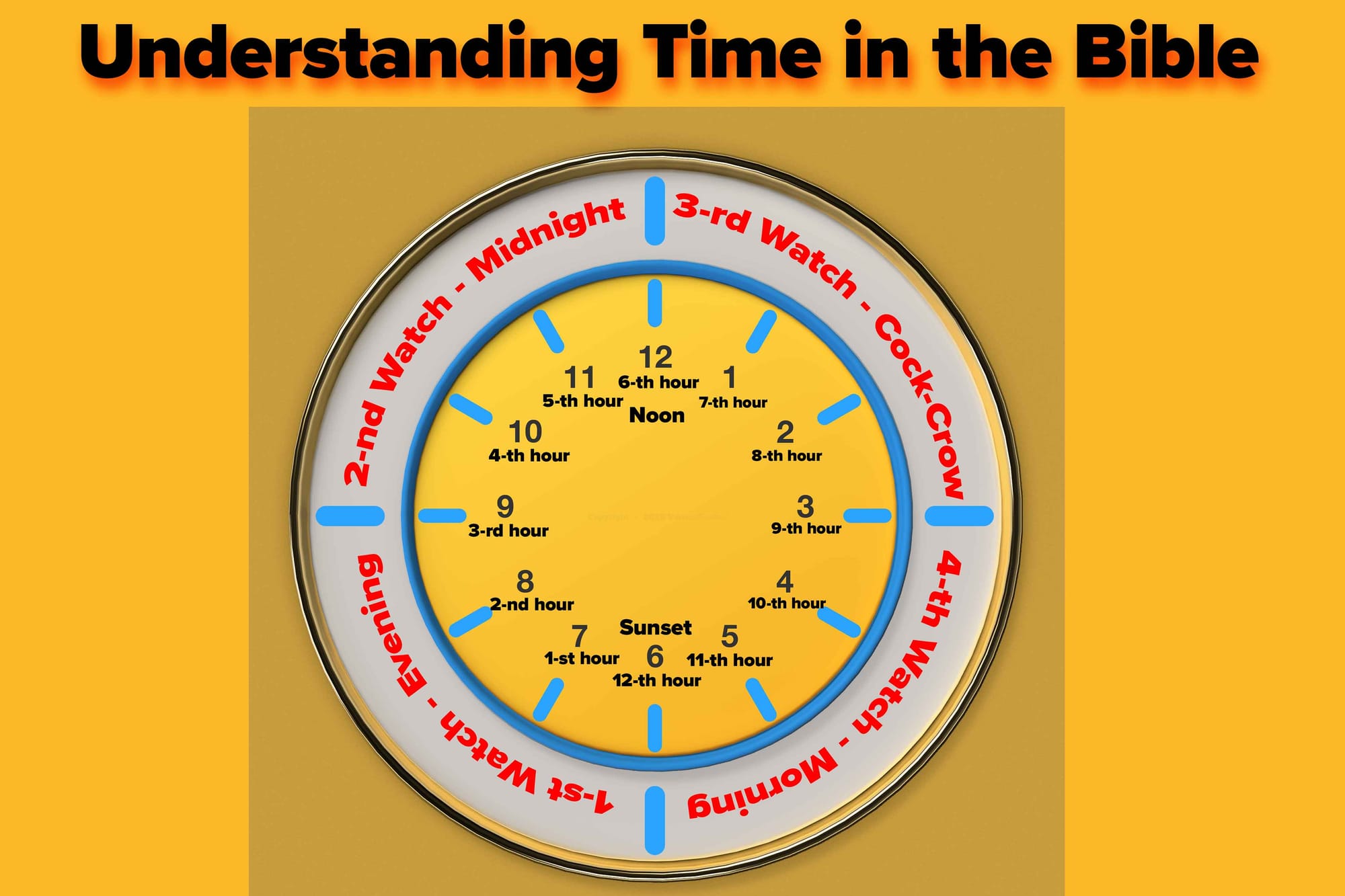Time in ancient Israel wasn’t reckoned by digital clocks or AM/PM designations, but by day-hours (12 equal divisions from sunrise to sunset) and night-watches (four watches of three hours each). When New Testament writers speak of the “third hour,” “sixth hour,” or “first watch,” they expect their readers to visualize the sun’s position or the darkness of night. Grasping this system enriches our reading of Scripture, clarifying the timing of Christ’s crucifixion, the sending of Peter in Acts, and the parables Jesus told.

Daytime Hours (1st–12th Hour)
| Biblical Hour | Modern Time (Equinox) | Scripture Example |
|---|---|---|
| Sunrise | 6:00 AM | Mark 16:2 |
| 1st hour | 7:00 AM | — |
| 2nd hour | 8:00 AM | — |
| 3rd hour | 9:00 AM | Matthew 20:3; Acts 2:15; 23:23 |
| 4th hour | 10:00 AM | — |
| 5th hour | 11:00 AM | — |
| 6th hour | 12:00 PM (noon) | Matthew 27:45; Mark 15:33; John 4:52; Acts 10:9 |
| 7th hour | 1:00 PM | John 4:52 |
| 8th hour | 2:00 PM | — |
| 9th hour | 3:00 PM | Matthew 27:46; Acts 3:1; 10:3,10:30 |
| 10th hour | 4:00 PM | John 1:39 |
| 11th hour | 5:00 PM | Matthew 20:6–9 |
| 12th hour | 6:00 PM (sunset) | Luke 4:40 |
- Sunrise (≈ 6 AM) marks the start of the first hour.
- Noon (12 PM) is the sixth hour (e.g. Jesus’ cry of dereliction: “My God, my God…”).
- Ninth hour (≈ 3 PM) often signifies crisis or prayer (e.g. Peter’s healing of the lame man).
- Eleventh hour (≈ 5 PM) features in the parable of the laborers (Matthew 20), highlighting God’s generous grace.
Night Watches (Four × 3-Hour Segments)
| Watch | Modern Time | Scripture Example |
|---|---|---|
| 1st Watch (Evening) | 6 PM – 9 PM | Lamentations 2:19 |
| 2nd Watch | 9 PM – 12 AM (midnight) | Luke 12:38 |
| 3rd Watch | 12 AM – 3 AM | Luke 12:38; Acts 23:23 |
| 4th Watch (Morning) | 3 AM – 6 AM | Matthew 14:25; Mark 13:35 |
- The first watch begins at sunset (≈ 6 PM) and runs until 9 PM.
- The “cock-crow” reference in Mark 13:35 (gr. ἀλεκτοροφωνίας) spans the transition from the third to fourth watch, as roosters often crow toward dawn.
- Jesus walking on the sea in Matthew 14:25 takes place “in the fourth watch” (≈ 3–6 AM), emphasizing His mastery even over the darkest hour.
Key Passages & Their “Clock” Context
- Crucifixion window: “And from the sixth hour to the ninth hour darkness fell over all the land” (Matt 27:45; Mark 15:33; Luke 23:44) – 12 PM to 3 PM.
- Parable of the Workers (Matt 20):
- “Third hour” hire at 9 AM (v. 3)
- “Sixth and ninth hour” hires at noon and 3 PM (v. 5)
- “Eleventh hour” hire at 5 PM (v. 6)
- Pentecost: Peter’s sermon begins at the “third hour of the day” (9 AM, Acts 2:15).
- Healing at the Temple Gate: Peter and John go to the temple at the “ninth hour” (3 PM, Acts 3:1).
- Cornelius’s vision: He prays at the “ninth hour” (3 PM, Acts 10:3) and Peter goes up at the “sixth hour” (noon, Acts 10:9).
- Paul’s escort: Men were dispatched at the “third hour of the night” (9 PM, Acts 23:23).
Why It Matters
- Historical-grammatical clarity
Recognizing “third hour” as 9 AM (not 3 PM) prevents misreadings — and shows Jesus teaching or performing miracles at specific, often symbolically significant, times of day. - Redemptive-historical resonance
The darkness from the sixth to ninth hour at the cross underscores creation’s groaning, as God Himself bears our sin in the heartbreak of midday darkness. - Spiritual application
- The fourth watch deliverance (Matt 14:25) reminds us that Christ comes in our darkest hours.
- The eleventh hour laborer teaches that it’s never too late to enter God’s kingdom.
By mapping biblical hours and watches onto our modern clock, we gain fresh insight into the timing and symbolism that saturate Scripture. Whether studying the cross, the day of Pentecost, or Jesus’ nighttime rescue, these time markers root us in the rhythms of God’s unfolding story — from creation’s dawn through Christ’s triumph to the glorious Morning of resurrection life.

🙏 Contribute to our efforts
Your generous support helps us continue sharing content grounded in Christ and growing in truth. Consider contributing through donations or prayers to sustain this ministry.
👉 🧺 Support Our Mission

Member discussion